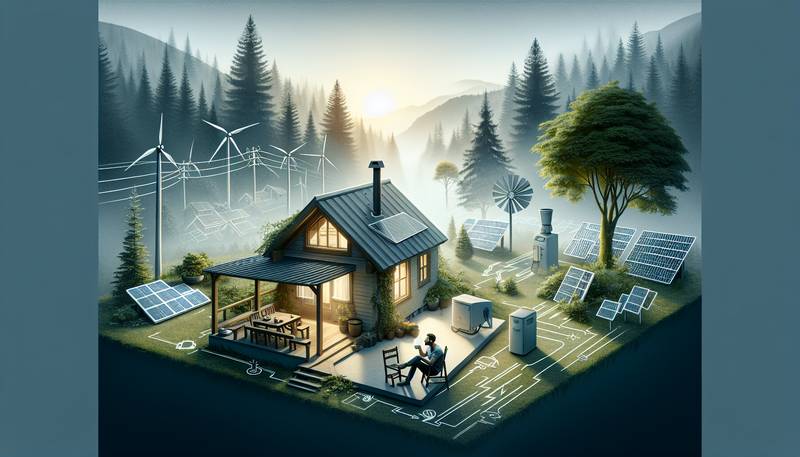Off-Grid Living: Electrical Solutions for Remote Homes

When a Battery Becomes Your Best FriendImagine a life where your morning coffee is brewed not by a fancy espresso machine, but by a solar-powered kettle that could probably double as a space heater. Off-grid living might sound like a venture for folks who enjoy wrestling with nature (and potentially losing), but with the right electrical solutions, it can be as cozy as a marshmallow in hot chocolate. Living without conventional power means embracing a certain romance with DIY projects—and possibly duct tape. When the power goes out in a city, people panic; when it goes out in the woods, people just adjust their expectations for candlelit dinners. With batteries becoming your steadfast companions, understanding how to utilize and maintain them can turn your off-grid experience into something else entirely. Just remember: overcharging your battery isn’t the same as giving it a pep talk. Solar Panels: The Sun's Gift to HumanityNothing says “I’m living my best life” quite like slapping a couple of solar panels on your roof and proclaiming yourself the sun’s favorite child. Solar energy is the golden ticket for remote homes, converting sunlight into power like a magician pulling rabbits out of hats. Your average solar panel is not just a piece of glass; it’s a portal to energy independence. Installation might involve math more complicated than some high-school prom calculations, but the payoff is worth it. Just think: no more bills from the electric company, unless they start billing for moonlight hours. Investing in a solar system typically means understanding how to size your setup based on your energy needs. Consider elements like:- Daily energy usage (because watching cat videos all day adds up)
- Sunlight availability (you can’t collect solar energy at midnight—believe me, I’ve tried)
- Battery storage capacity (your backup plan for when the sun decides to take a vacation)
Wind Turbines: Harnessing Nature’s WhispersIf the sun is blaring with bravado, wind is the gentle whisper that can power your remote home, provided you’re not living in a place where the most excitement comes from a stray tumbleweed. Wind turbines can be a fantastic addition to your off-grid arsenal, provided you find a location where they won’t just spin in circles, feeling lost and neglected.Selecting the right wind turbine requires a tad of finesse. Factors include:- Average wind speed (remember, you’re not charging it with your breath)
- Height of your mounting tower (let’s avoid a ‘just barely’ situation)
- Local zoning laws (you may need to avoid becoming the neighborhood’s windmill enthusiast)
Of course, the beauty of wind energy is that it doesn’t have to play well with the sun; windy days can mean a cocktail of energy while you sip your solar-powered coffee.Battery Storage Solutions: Holding Onto PowerSo you’ve got that sweet setup with solar panels and possibly a wind turbine—great! Now, how do you hold onto all that glorious energy for when the sun decides to snooze? Battery storage systems are like your off-grid home’s bank account, ready to deposit and withdraw energy as needed. Choosing the right battery can be akin to picking your favorite dessert—everyone has preferences! Consider options like:- Lithium-ion batteries (light and high-tech, just like your smartphone)
- Lead-acid batteries (traditional, reliable, and the equivalent of a warm apple pie)
- Saltwater batteries (because who doesn’t want a little seasoning in their life?)
And remember, every battery needs love and care. Look out for maintenance tips to ensure your energy bank doesn’t go bankrupt when the clouds roll in.Living Off the Grid: A Shocking RealityMaking the jump to off-grid living can feel like a leap of faith with a trampoline made of solar panels and wind gusts. It’s a unique experience that combines independence, creativity, and an occasional scavenger hunt for the remote control (which your pets will undoubtedly hide). Embracing this lifestyle opens a world of possibilities, often accompanied by the satisfaction of knowing you’re virtually untethered from mainstream energy systems. It’s not just about surviving; it’s about thriving—often with a quirky smile while you figure out the best way to cook a three-course meal on a camp stove. Choosing to live off the grid may not make you the next reality TV star, but it certainly puts you on the cutting edge of self-sufficiency. And who knows? You might even impress a few friends with your new-found skills in energy management, or at least with your impressive collection of solar-powered gadgets. Current Events: Powering Up and Moving ForwardAs energy solutions evolve, the options for embracing off-grid living become more innovative and accessible. With each advancement, the path to energy independence transforms from a hike laden with boulders into a leisurely stroll along a scenic route. The key is to stay informed, connected with fellow off-grid enthusiasts, and, above all, keep a hefty supply of marshmallows handy for your fire pit gatherings. Remember, it’s all about finding your spark—just be careful not to short-circuit your ambitions along the way!
|
|







